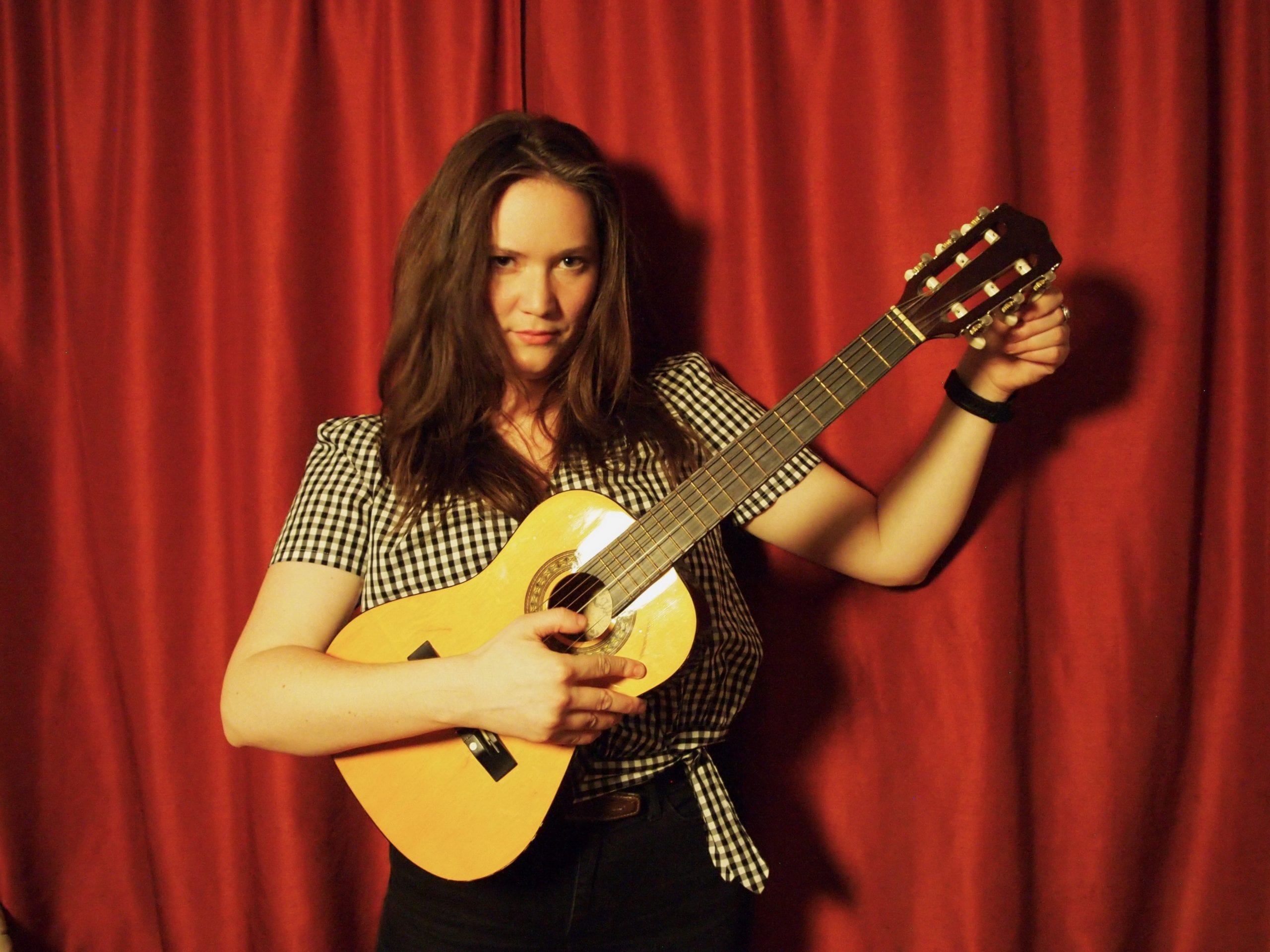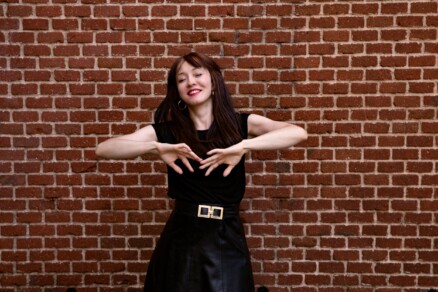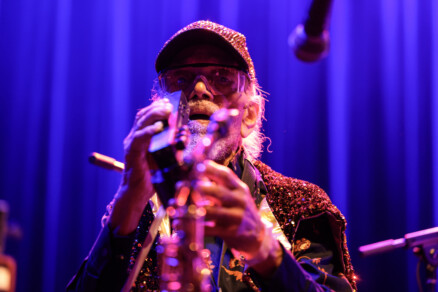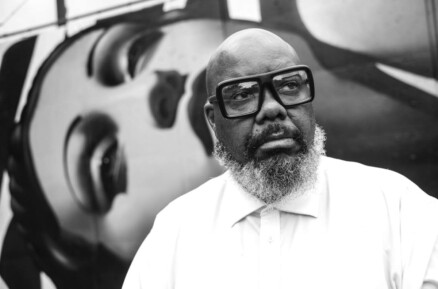Wendy Eisenberg on growing up in Gaithersburg, and making ‘multilingual’ guitar music

Wendy Eisenberg is a guitarist — and a vocalist, banjo player, writer and poet — who recently released a string of recordings that show off her extraordinary versatility.
Last October, Eisenberg — a native of Gaithersburg, Md., who now lives in Western Massachusetts — simultaneously issued the solo acoustic album Its Shape Is Your Touch and the John Zorn-produced electric trio project The Machinic Unconscious. Taken together, these records are clear evidence of Eisenberg’s ability to project a singular voice within a range of musical frames.
This is not to say all her music sounds the same. Eisenberg works for lucid expression, but the form that takes can vary widely: Each of her projects uses the materials at hand to expand the languages with which they are already associated.
Eisenberg has not slowed down since the release of those albums last year. The formation of a new rock band, Editrix, and a recent recording with fellow guitarist Shane Parish, Nervous Systems, makes it clear that she likes to move in many spheres simultaneously — and she manages to bring rigor to each one.
On Friday, at an undisclosable DIY venue in Washington, D.C., Eisenberg will perform with Editrix. I conducted an email interview with her about growing up as an improvising musician in the D.C. area, her musical philosophy, and what’s in store for the future. (If you’re interested in attending the performance, Wendy has given CapitalBop permission to give out this email address; you can write her there for more details about the location and time: [email protected])
This interview has been edited for length and clarity.
CapitalBop: You grew up in Gaithersburg, correct? Can you tell me some ways that being brought up in the area may have influenced your musical direction?
Wendy Eisenberg: I was so lucky to be surrounded by other talented jazz musicians in the area — Eli Aleinikoff, Dan Pappalardo, Jake Silverman and Aaron Seeber all come to mind — and to be influenced by their dedication to the art form and early mastery of it. The proximity to major clubs in D.C., with less of the cultural clout and baggage of New York City, allowed me to feel comfortable playing; it wasn’t like a low barrier to entry, but the myth of New York being the be-all, end-all of improvisation (which continues to vex me) didn’t apply to the D.C. and Baltimore scenes, where the music was just as good. I felt embraced as a youngster out there.
However, because Gaithersburg was further out than, say, Bethesda or Chevy Chase, my participation in these scenes was less than it could’ve been, and I credit some of my outsider mentality within the jazz language and lifestyle to my physical/existential distance from the major cities of the area. While I was constantly playing in the city, participating in some of the Blues Alley and Georgetown jazz youth outreach things, studying with [the late guitarist] Paul Wingo — my hero to this day — and playing out with him a little bit in Baltimore, playing concerts in D.C. with graduates of these jazz programs, a lot of my time was spent practicing bebop in my house with nobody to tell me whether I was doing it “right” over the changes. That solo practice led to me being idiosyncratic on the instrument, but also made for a lot of work when I entered the rigorous, perfectionist environment of the Eastman School.
CB: Did you attend any of the jazz camps or music schools around here or have any local mentors?
WE: I didn’t do Paul Carr, which I regret, because he is such a resource, but I did the Blues Alley Youth Orchestra, and led a guitar quartet out of the basement of the church where we practiced. I got my ears sharpened there and met a bunch of musicians there which led to gigging more in the area. It is such a special thing to be able to have these kinds of programs around; I felt safe to improvise as myself there. I was mentored by Paul Wingo, who I mentioned earlier — a really special person, really spiritual and deeply about *the music*. He always worked with me on developing my own kind of language, affirming my musical aesthetics as he gave me the theoretical and practical techniques on the instrument.
CB: Does your upbringing here continue to mean anything to you as an artist?
WE: I think the D.C. area, and the people from it, fosters a kind of responsible politeness on and off the bandstand that is really different from the aggression and machismo so common in the Northeast. There was still obviously toxic stuff in D.C. — the maleness of the jazz world has all but assured that as a constant — but D.C. seemed a little more gender-diverse to me. Baltimore and D.C. have a strong contingency of women in jazz to look up to, so while I was participating in the scene as a student, even in all-male situations I felt safe a good 90 percent of the time. My upbringing in the D.C. area remains important to me for several other reasons, though. I feel like being from there, versus a big city or the Midwest or California, allows a different kind of musical otherness. There’s a sound — I hear it in [Anthony] Pirog, in Seeber — of total competence, but a little gnawing thing that seems unclassifiable but essential to the city. Maybe it’s the ethos of the government town and its concomitant rebelliousness and subversion; maybe i’m totally projecting. But I can hear it when I close my eyes.
The other thing is that Maryland, for some reason, has a ton of guitar virtuosos. I’d count Wingo, but we have Danny Gatton, Robbie Basho, John Fahey, I guess you could count [Frank] Zappa … I’ve taken a lot of technique and composition stuff from these players, particularly Gatton’s speed and corniness and good humor. I feel like if I gain enough significance before I die, I could be considered part of that lineage.
CB: Can you tell me how the trio on The Machinic Unconscious came together?
WE: I was commissioned by [John] Zorn to make a trio for an album of improvised music for Tzadik [Records, founded by Zorn]. Trevor [Dunn, bassist] was always going to be a part of it. I was encouraged to choose between a few drummers to complete the trio and chose Ches [Smith], in large part because the original impetus for the commission may have been when we all played together in the second-to-last improvisation night at the old Stone location [in New York City]. My thoughts were kind of simple — let’s keep building on whatever magic we’d found that night. I also knew their track record, with Trio Convulsant and the record for NNA with Travis Laplante, and liked the idea of my first significant group album on such an important label being with amazing ringers, where I get to be kind of the next voice in some kind of lineage.
I don’t feel conflict in making art now, rather than doing any number of more “important” humanitarian things, because, and I hold this to be extremely true, the truest revolt against fascism is to make complicated things.
CB: How, if at all, do you conceive of being a professional artist along with the role of art in contemporary America? Do you feel any conflict between the doing of the activity and the narrative frame the culture surrounds it in?
WE: I think my relationship to being a professional artist has less to do with the role of art in America than it does my relationship to the twin pillars of economics and the human soul. A large part of my personal work on this earth is disentangling the work I do for joy and the work I do for money, and considering obligation in both of those worlds. I think the role of art in contemporary America, if I were to gesture however feebly towards a real opinion on such a multiverse, has to do with what voids deserve to be filled, additively really, an encouragement of active voices. That’s why the real great art forms are ones of actual commitment, where the risk and idiosyncrasies are in the music itself and not the narrative about it from some kind of industry.
To speak more specifically, and to your second question, I think art’s function is like a window and a mirror (I mix up those words regularly in casual conversation and have turned it into a trope for myself to interrogate art and other eternal things). People make things because they can’t view themselves. With each kind of artistic externalization, a more cogent identity comes into being for the creator, kind of like whatever fundamentally uncynical thing can exist and be called a “brand.” I don’t feel conflict in making art now, rather than doing any number of more “important” humanitarian things, because, and I hold this to be extremely true, the truest revolt against fascism is to make complicated things. The brands of lesser artists, if such a thing exists, are simple ones that can become evil rallying cries: “Lock her up!” type things. For artists I know, and the artist I want to be, our messages are more complex. Our existence and persistence is a miracle and the hope of a more interesting world.
CB: You perform/write in a variety of musical contexts: band, solo, acoustic, electric, idiomatic, non-idiomatic, etc. How does this relate to your feelings about communication and expression?
WE: I think the diversity of my output has to do with my desire to be understood. I think it’s possible to be understood, especially when you give about a million examples of a given set of values — something will touch somebody, something won’t touch somebody else, but either way the diversity of my artistic expressions makes it possible for many target listeners to exist and engage with things I care about, and that makes it more possible for me to grow as an artist than doing one thing well would. We need those artists too, but I believe in reiteration, in theme and variations, as the ultimate bid for understanding. It’s a different kind of persuasion.
Also I think any intention to be understood must be kind of masked in order to be actually effective. I’m not talking over my music, saying “Understand me! Here’s my obvious political idea!” It’s oblique. Listeners have to feel like they put their understanding of something together internally, by themselves. Having many things out at once lets me hide in a ton of interesting masks. The guitar is multilingual that way; it can handle it.
CB: To me, your music has the quality of every moment holding equal weight. Is this something you have any thoughts about?
WE: Yeah, I am really flattered by it. Ultimately, the cliché that deliberate silence is the context and background for works of art music kind of holds for me, and each choice I made is as deliberate as the idea that “I will be making music now on this silent backdrop, in this room and in this mood.” It’s nice to hear that that’s actually audible and not a false pretense.
Having many things out at once lets me hide in a ton of interesting masks. The guitar is multilingual that way; it can handle it.
CB: Do the inherited images, language and politics surrounding women in this culture influence your ideas about what you want to communicate musically or in general?
WE: In the sense that part of me just wants to win, yeah, it does. I still feel like I have to be thin; that I have to be beautiful at the gig; that I have to dress, if not respectfully, then very cool. I wonder if saying this will make people wonder if my outfits are calculated. I also feel like I’ve trafficked in the DIY queer-core scene enough to have an idea of where I can and should take up space as a queer cis-woman, but am still somehow constantly surprised at the casual sexism that I deal with among older experimental musicians. This has no bearing on the music I make, but it does make me feel some type of way about how I present music to the world.
CB: Can you describe how you understand the concept of composition as it relates to improvisation and the “non-idiomatic zone” of music-making? Does this alter from solo projects to group ones?
WE: I have some kind of anxiety about the concept of composition because when I am consciously composing and thinking that I am composing, I kind of think that I’m doing it wrong. I’m not sure why that is. However, when I sit down to write a song, which I try to do very often but don’t have as much time for as I’d like, I can write these innovative things that I’ve never really heard before, and when I write communally in a rock band, I find that the complexity and textures that my collaborators and I explore are similarly rare. I’ve tried to take composition lessons before and professional timing has failed me (aka I got too busy and couldn’t follow through, which I suppose is some kind of prioritization issue that again stems from insecurity as a composer).
Re: composition in the non-idiomatic zone, when I am improvising I am thinking compositionally, in the sense that I am feeling time not only in the present but the alternate universes the material I’m drawing on can suggest. I liken what I do to some kind of game that requires no strategy: It’s non-teleological, but I set the parameters and play little developmental games to set free some of the crazier things inherent in the material. That’s what composition is to me, at my least anxious about influence — taking what the material suggests and dealing with it, manipulating it, time traveling and intention-traveling as well. My thing is: As an improviser I have to deal with less psychology between me and the source material when I’m engaging with it in real time. When I compose similarly, in the genre of “composed music” and not, like, songs or rock music, I have a tendency of getting in my way, so I rarely ever do it. Though, telling you this makes me feel like now I can start.
CB: I’ve seen you use the word “leader” in airquotes when referring to your position in the trio. Can you go into this? How do you understand “leadership” in an improvised group setting?
WE: I think in the sense that the band on Machinic Unconscious was assembled kind of “for” me and my name is on the spine, I am the leader, but I don’t really feel like that’s the case musically, nor do I like to. I don’t perceive of myself as leader of any of my bands, even if I organize stuff or front it/sing or anything. That’s not how bands work for me, though I know people can get/have gotten stuck in the idea that I’ve been trying to take over. I think it has to be equal.
Coming from a place where I’ve been traumatized by inequalities in power, I’m extra-sensitive to hierarchies and never want anyone to feel like their voice isn’t as generative or important to the things. I think leaders exist only if the music is composed by one person entirely, or only in the ideas of marketing execs.
CB: If it’s interesting to you, could you talk about the process of giving names to your songs?
WE: I am horrible at giving titles to the songs. I listen and think melodically, and often think about what I was reading around the recording of the music. [Writers] William Gaddis and Alice Notley have such amazing rhythm. So does trendy French philosophy. It all feels meaningful, and it is, but it comes from a broader space in terms of influence, and a narrower one in terms of direct application to a particularly attractive musical gesture.
I don’t perceive of myself as leader of any of my bands, even if I organize stuff or front it/sing or anything. That’s not how bands work for me … I think it has to be equal.
CB: You are fronting the rock band Editrix currently. Do you write the lyrics? I’ve noticed in my own experience, narrative assumptions can arise when lyrics enter the picture. Do you notice anything similar?
WE: I write the lyrics, yeah, always after the melody. I do notice that I assume things that people say are part of who they are, but I have no idea or design of an idea of what Editrix lyrics in particular say about my front-person affect or what the band espouses. Sound first. My solo songs contain all the appropriate fodder for narrative assumptions. I’ve never lied in a song.
CB: How does musical expression, if at all, connect to love from your perspective?
WE: I believe in everything Albert Ayler has said on the matter. Somewhat incongruously, I believe in God, and I believe in the axiom that God is love. We wouldn’t make music if we didn’t care about it, especially not weird, challenging music. That the “genre” of free jazz and experimental music and improvisation, whatever, exists is like an image of God but really, it’s just another mode.
CB: Do you have anything (projects, news, musings) you’d like to share?
WE: I am recording the newest songs record now. It is different than anything I’ve ever done. I’ve recorded two versions already and none of them said what I wanted them to. These are important songs to me, and the spice keeps flowing, but these are new feelings. There are three people named Nick involved.
Also listen to Editrix and revisit Time Machine if you’d like.


